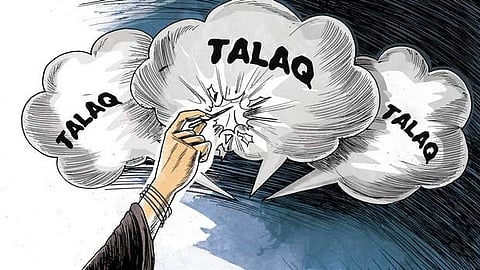

A law against instant triple talaq is really a welcome development. In fact, Muslim women have been calling for reforms in Muslim Personal Law for the last 10-15 years now. Muslim women are entitled to legal protection in matters of family law just like all other Indian women. The Parliament passed the Hindu Marriage Act in 1964 followed by the Hindu Succession Act and a host of other laws under the Hindu Code Bill. The parliament also amended the Indian Divorce Act to enable Christian women to get divorce rights. It is only the Muslim women who were left out of the ambit of legal protection.
The Constitution of India entitles every citizen including, Muslim women to gender justice and gender equality but because of the politics in our country where it was felt it is better to leave matters of Muslim family law as they comprise “internal matters” of the Muslim community, this has led to tremendous injustice to Muslim women in the form of instant triple talaq, halala, polygamy etc.
Despite Quranic injunctions which grant equal rights to women in matters of divorce, they have not translated into reality for Muslim women. As a result, many Muslim women were forced to raise their voice against triple talaq and the matter reached the Supreme Court which declared instant triple talaq as void in its judgment of August 2017. But even after the judgment, there have been several instances of instant triple talaq and throwing out of women from their homes continue. So, there was a need for a law that to take the judgment implementation forward. Ideally, the parliament should bring out a comprehensive Muslim family law which should be based on Quranic injunctions and conform to the constitutional parameters of justice and gender equality. Such a Muslim family law should regulate subjects such as consent before marriage, age of marriage, mehr, procedure of divorce, make polygamy and halala as illegal, give share to women in property, give guardianship and custody of children to mother and father both and encourage registration of marriages. We are a patriarchal society and all Indian women suffer the brunt of patriarchy.
We at Bhartiya Muslim Mahila Andolan had suggested various amendments in the Bill that was originally brought out by the government. We wanted the right to register the FIR to be only with the women. We also wanted that the offence should be bailable and compoundable. We wanted that even one per cent chance of reconciliation between husband and wife should not be ruled out and we also wanted the woman to have the right to reside at her marital home. So, two of these amendments have been accepted by the government which we are happy about it. The objective of the law is not punishing the husbands but to enable women to get justice and fair play. I feel this law will give some bargaining powers in the hands of women. A woman will be able to bring her husband to the discussion table and will be able to demand some fairness in the fate of a divorce.
Although punishment in itself is not the objective but without deterrence, a law will be meaningless. All women affirmative laws such as the bigamy law, the dowry law, the domestic violence law, POCSO law have grave punishment provisions but sill women continue to suffer and the woman still has to bear the brunt of patriarchal mindset. Nevertheless, the Hindu and Christian women and enjoy a semblance of legal protection thanks to the interventions of parliament in the form of codified family laws. Muslim women are seeking parity with their Hindu sisters and Christian sisters and I feel that the passage of triple talaq law will be a step in that direction.
Zakia Soman
Co-founder of the Bharatiya Muslim Mahila Aandolan